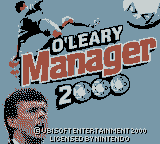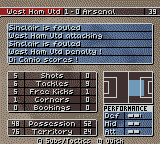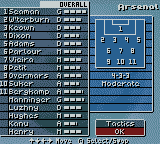Retro Replay Review
Gameplay
O’Leary Manager 2000 strikes a delicate balance between deep managerial simulation and the on-pitch action of classic arcade-style soccer. You can don the manager’s hat to craft training schedules, juggle transfers, and analyze a wealth of statistics, or slip into the boots of your star striker and take control in real time. This duality of roles feels fresh even two decades on, offering both the strategic depth of a game like Championship Manager and the pick-up-and-play appeal of Sensible World of Soccer. Matches themselves can be played out in three modes: a full top-down action view, a streamlined text commentary with occasional illustrative highlights, or a fast-forward simulation for those pressed for time.
(HEY YOU!! We hope you enjoy! We try not to run ads. So basically, this is a very expensive hobby running this site. Please consider joining us for updates, forums, and more. Network w/ us to make some cash or friends while retro gaming, and you can win some free retro games for posting. Okay, carry on 👍)
The game boasts a roster of 240 fully licensed teams drawn from the top two divisions across six major European leagues. Transfer windows come alive as you negotiate with AI clubs, scour the lower leagues for hidden gems, and manage wage bills to fit your ambitious budgets. Tactics menus let you experiment with everything from rigid 4-4-2 formations to fluid, possession-based systems, while your training regimen impacts player fitness, morale, and form. Each choice has ramifications: a poorly timed substitution can derail a title challenge just as easily as a shrewd scouting acquisition can ignite a promotion push.
Multiplayer support broadens the replay value, permitting hotseat management duels or head-to-head single matches against friends. Whether you’re racing through an entire season or jumping into a standalone cup final, the variety of match types and the blend of managerial and player-controlled segments keep the experience from growing stale. Thoughtful AI behavior adds unpredictability, ensuring that no two seasons play out the same way.
Graphics
Visually, O’Leary Manager 2000 embraces the 2D, top-down aesthetic common to many late-’90s soccer titles. Pixel-perfect pitch lines, tiny but recognizable player sprites, and simple stadium backdrops evoke a sense of nostalgia for Amiga-era fans. While these graphics won’t rival modern 3D engines, they remain clear and functional, providing all the necessary information at a glance. Animations are basic—but purposeful: a slide tackle, a headed clearance, or a celebratory fist pump all convey the mood of the match without overwhelming the player.
The user interface is organized into distinct windows for team sheets, transfer markets, and training plans. Menus use color-coding and tabbed navigation to keep hundreds of data points approachable. Pop-up stats screens and match highlights appear swiftly, minimizing downtime between decisions. Though the resolution feels cramped on today’s widescreens, the developers’ deliberate use of space ensures critical information never hides behind nested menus.
Sound effects and crowd ambiance bolster the sense of immersion: chants rise and fall in accordance with your team’s fortunes, while the referee’s whistle and the commentators’ brief, canned exclamations punctuate the on-field action. It’s not an audio tour de force, but the soundtrack and sound FX complement the pixel graphics and clear UI, ensuring you stay engaged from kickoff to final whistle.
Story
Strictly speaking, O’Leary Manager 2000 lacks a traditional narrative—there’s no single-player campaign with cutscenes or defined plot threads. Instead, the “story” emerges organically through your career trajectory: you might begin as an unknown coach in the second division, clawing your way toward European glory through shrewd signings and tactical masterclasses. Each victory, defeat, or upset weaves into an overarching tale of ambition, adversity, and managerial legacy.
David O’Leary’s involvement adds a pseudo-narrative layer, as you’re continually reminded of his footballing philosophy—prioritizing youth development, disciplined pressing, and clean, efficient play. Although there are no voiced press conferences or branching dialogue choices, the tension of contract negotiations and boardroom expectations frames your rise (or fall) as a football boss. Every transfer deadline day carries the weight of a dramatic climax, even without scripted cutscenes.
Further narrative flavor springs from the licensed teams’ histories and rivalries. Local derbies crackle with extra intensity, and continental fixtures against storied European giants feel like marquee events. Your personal storyline unfolds match by match, season by season, as you strive to outwit AI managers, quell media criticism, and etch your name into the game’s hall of fame.
Overall Experience
O’Leary Manager 2000 delivers a surprisingly robust managerial sim that remains accessible to newcomers while offering enough depth for seasoned veterans. The hybrid structure—letting you alternate between boardroom decisions and arcade-style play—ensures that no two play sessions feel alike. The breadth of licensed teams and the multiple modes of match resolution offer high replayability, so you can chase promotions, domestic cups, or full European campaigns at your own pace.
Its dated presentation might be off-putting for those expecting photo-realistic 3D graphics or modern UX conveniences. However, the throwback charm and depth of systems more than compensate, especially for players who appreciate the tactical nuances of early-2000s sports management titles. With support for multiplayer and single-match quickplays, it becomes equally at home as a laid-back weekend diversion or a marathon managerial odyssey.
In the context of its era—released alongside David O’Leary’s Total Soccer 2000—O’Leary Manager 2000 stands out as a thoughtful, engaging alternative to purely action-oriented soccer titles. For football fans who long to micromanage their dream squad while still taking charge on the pitch, this game remains a hidden gem worth revisiting. It may not rewrite the genre’s rulebook, but it strikes a satisfying chord between the manager’s office and the grass, keeping players invested from preseason friendlies all the way to last-minute title deciders.
 Retro Replay Retro Replay gaming reviews, news, emulation, geek stuff and more!
Retro Replay Retro Replay gaming reviews, news, emulation, geek stuff and more!









Reviews
There are no reviews yet.